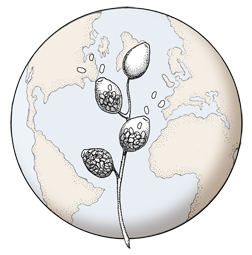References
. Pathogenicity of Swedish isolates of Phytophthora quercina to Quercus robur in two different soils. New Phytologist. 2003 ;158(2):355 - 364.
. First records of soilborne Phytophthora species in Swedish oak forests. Forest Pathology. 2003 ;33(3):175 - 179.
. Spread of an invasive pathogen over a variable landscape: a non-native root rot on Port Orford cedar. Ecology [Internet]. 2002 ;83:3167-3181. Available from: http://www.esajournals.org/doi/abs/10.1890/0012-9658%282002%29083%5B3167%3ASOAIPO%5D2.0.CO%3B2
. Update on the 35-year expansion of the invasive root pathogen, Phytophthora lateralis, across a landscape of Port Orford cedar (Chamaecyparis lawsoniana) . Forest Pathology [Internet]. 2014 :165-168. Available from: http://doi.wiley.com/10.1111/efp.12158
. Development of a lab-on-a-chip device for diagnosis of plant pathogens. Biosensors and Bioelectronics [Internet]. 2011 ;26:4070 - 4075. Available from: http://www.sciencedirect.com/science/article/pii/S0956566311001916
. Involvement of soilborne Phytophthora species in Central European oak decline and the effect of site factors on the disease. Plant Pathology. 2000 ;49(6):706 - 718.
. New insights into the survival strategy of the invasive soilborne pathogen Phytophthora cinnamomi in different natural ecosystems in Western Australia . Forest Pathology [Internet]. 2013 ;43(4):266–288. Available from: http://onlinelibrary.wiley.com/doi/10.1111/efp.12025/abstract
. Re-evaluation of Phytophthora citricola isolates from multiple woody hosts in Europe and North America reveals a new species, Phytophthora plurivora sp. nov. Persoonia - Molecular Phylogeny and Evolution of Fungi. 2009 ;22(1):95 - 110.
. Three new species of Phytophthora from European oak forests. Mycological Research. 2002 ;106(4):397 - 411.
. Involvement of Phytophthora species in the decline of European beech in Europe and the USA. Mycologist [Internet]. 2005 ;19:159 - 166. Available from: http://www.sciencedirect.com/science/article/B7XMS-4R10WR2-5/2/37dcb413ca17af3b17f99e6101570c65
. Multiple new Phytophthora species from ITS Clade 6 associated with natural ecosystems in Australia: evolutionary and ecological implications. Persoonia - Molecular Phylogeny and Evolution of Fungi [Internet]. 2011 ;26(1):13 - 39. Available from: http://www.ingentaconnect.com/content/nhn/pimj/2011/00000026/00000001/art00002
. Phytophthora root and collar rot of alders in Bavaria: distribution, modes of spread and possible management strategies. Plant Pathology [Internet]. 2004 ;53:197 - 208. Available from: http://onlinelibrary.wiley.com/doi/10.1111/j.0032-0862.2004.00957.x/abstract
A Survey in Natural Forest Ecosystems of Vietnam Reveals High Diversity of both New and Described Phytophthora Taxa including P. ramorum. Forests [Internet]. 2020 ;11(1):93. Available from: https://www.mdpi.com/1999-4907/11/1/93https://www.mdpi.com/1999-4907/11/1/93/pdf
. Phytophthora root and collar rot of alders in Bavaria: distribution, modes of spread and possible management strategies. Plant Pathology [Internet]. 2004 ;53(2):197 - 208. Available from: http://doi.wiley.com/10.1111/j.0032-0862.2004.00957.x
. Phytophthora gallica sp. nov., a new species from rhizosphere soil of declining oak and reed stands in France and Germany. Mycological Research. 2008 ;112(10):1195 - 1205.
Diversity of Phytophthora species in natural ecosystems of Taiwan and association with disease symptoms. Plant Pathology [Internet]. 2017 ;66:194–211. Available from: http://doi.wiley.com/10.1111/ppa.12564http://api.wiley.com/onlinelibrary/tdm/v1/articles/10.1111%2Fppa.12564
. Phytophthora quercina sp. nov., causing root rot of European oaks. Mycological Research [Internet]. 1999 ;103(7):785 - 798. Available from: http://www.sciencedirect.com/science/article/pii/S0953756208606115
. Multiple new Phytophthora species from ITS Clade 6 associated with natural ecosystems in Australia: evolutionary and ecological implications. Persoonia - Molecular Phylogeny and Evolution of Fungi [Internet]. 2011 ;26:13-39. Available from: http://www.ingentaconnect.com/content/nhn/pimj/2011/00000026/00000001/art00002
Diversity of Phytophthora species in Valdivian rainforests and association with severe dieback symptoms . Forest Pathology [Internet]. 2018 :e12443. Available from: https://onlinelibrary.wiley.com/doi/abs/10.1111/efp.12443
. Canker and decline diseases caused by soil- and airborne Phytophthora species in forests and woodlands. Persoonia - Molecular Phylogeny and Evolution of Fungi [Internet]. 2018 ;40(08):182-220. Available from: http://www.ingentaconnect.com/content/nhn/pimj/10.3767/persoonia.2018.40.08
. Phytophthora pseudosyringae sp. nov., a new species causing root and collar rot of deciduous tree species in Europe. Mycological Research. 2003 ;107(7):772 - 789.
. Beech decline in Central Europe driven by the interaction between Phytophthora infections and climatic extremes. Forest Pathology [Internet]. 2009 ;39(2):73 - 94. Available from: http://onlinelibrary.wiley.com/doi/10.1111/efp.2009.39.issue-2/issuetoc
Detection and eradication of Phytophthora ramorum from Oregon forests, 2001–2008 . Sudden oak death fourth science symposium [Internet]. 2010 ;Gen. Tech. Rep. PSW-GTR-229:3-5. Available from: http://www.fs.fed.us/psw/publications/documents/psw_gtr229/
. Phytophthora ×alni and Phytophthora lacustris associated with common alder decline in Central Portugal . Forest Pathology [Internet]. 2016 ;46(2):174 - 176. Available from: http://doi.wiley.com/10.1111/efp.2016.46.issue-2http://doi.wiley.com/10.1111/efp.12273
. Phenotypic diversification Is associated with host-induced transposon derepression in the sudden oak death pathogen Phytophthora ramorum. PLoS ONE [Internet]. 2012 ;7:e34728. Available from: http://dx.doi.org/10.1371%2Fjournal.pone.0034728



 ]
]